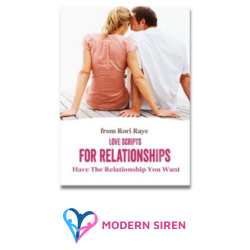It’s okay to say no.
You don’t have to go along with whatever someone else wants you to do, even if that person is your partner or spouse. If you’re not comfortable doing something, say so, and mean it. It’s also okay if your mind changes in the middle of an activity or task; that happens to everyone from time to time!
If someone doesn’t respect your boundaries (for example, they repeatedly try and talk you into going out when you said no), they don’t respect YOU as a person at all. That’s a sign that it’s not right for you two together in this relationship. If this keeps happening over and over again, then maybe there are some deeper issues at play here… and maybe it isn’t worth staying together for one more day than necessary or healthy for either party involved.
Setting a boundary means respecting yourself first.
Setting boundaries is an act of self-care. It’s often said that it takes two to tango, but the reality is that healthy relationships should be built on a foundation of mutual respect and care for one another. Having healthy boundaries means you’re respecting yourself just as much as you respect your partner, if not more so.
Setting boundaries isn’t always easy. It can take strength and courage to set them in the first place, especially if they go against what our loved ones want or expect from us. But setting these kinds of limits shows our loved ones how much we value ourselves—and that makes all the difference in creating lasting bonds with others.
Establishing your boundaries doesn’t mean your relationship will fail.
In fact, it might actually make it stronger.
Healthy boundaries give you the opportunity to show that you respect yourself and are worth being treated with care and respect. Boundaries can help a relationship flourish by giving both parties room to grow independently without feeling like they’re tied down or trapped in an unhealthy situation. You can have a happy, healthy relationship without sacrificing who you are as an individual!
Boundaries are not just about starting fights.
When you set a boundary, you’re telling yourself that it’s okay to say no to things that make you feel uncomfortable or unhappy. You deserve to be treated with respect, and your happiness is more important than someone else’s wishes or needs at any given time.
A healthy boundary doesn’t have anything to do with holding grudges or making someone feel bad for what they did in the past, it’s about protecting yourself from being taken advantage of in the future. You don’t want to put up with bad behavior, period!
Being open is important, but not at the expense of your dignity.
Being open with someone is a good thing, but being open at the expense of your dignity is not. It’s okay to keep some things private, whether it’s about your family, past relationships, or even something silly like the fact that you have a weird obsession with collecting rubber duckies. If you think that something would make you feel embarrassed or ashamed if it were shared during an argument or in other situations where emotions run high and potentially become volatile, it might be best not to share it all. Some things are just better left unsaid!
People deserve to be treated with respect and kindness, but that doesn’t mean you should put up with someone mistreating you in any way.
You deserve to be treated with respect and kindness. This is a given, but it’s important to remember that you deserve this because of who you are, not for any other reason. That doesn’t mean you can’t stand up for yourself or set boundaries around how others treat you. It does mean that if someone mistreats you in any way (even if they don’t realize they’re doing it), there’s no need to put up with it.
People do not have an obligation to take care of other people, especially those who show no desire or ability to care for themselves. Even though we all want someone else in our life who will help us heal from our past wounds, these relationships rarely work out the way we hope they will—and sometimes even end up causing more harm than good! If someone constantly puts down your ideas or never listens when describing your own life story, then perhaps this isn’t the right person after all?
Never apologize for asking for what you need to feel safe, secure and happy in a relationship.
How to ask for what you need.
Be specific, and don’t be afraid to ask for things that might make the other person uncomfortable or feel judged. You’re not asking simply to be a martyr or martyr yourself; you’re doing this because it’s important to your well-being! If someone asks you how they can make your life better, tell them the truth: “I need X from you.”
What to do if you aren’t getting what you need from someone else.
If someone is not willing or able (for whatever reason) to give up their bad habit of violating boundaries, then it’s time for a serious conversation about whether or not that relationship should continue at all. You’re not being unreasonable in wanting boundaries respected, you deserve love and safety just as much as anyone else does! And if someone isn’t capable of providing those things through their actions and words, then maybe they don’t deserve our love after all.
It’s okay to set boundaries with anyone, not just romantic partners.
The rules for healthy boundaries in relationships apply to all types of relationships, not just romantic ones. They can be as simple as saying “no” to a request from your family or friend, or they can be much more complicated and nuanced. For example, you may need to set boundaries with your boss about how much time you spend at work (and whether or not it’s okay for them to demand that time).
In the same way that defining the limits of one relationship helps keep them healthy, setting boundaries with other people will help keep those relationships going strong!
Another great benefit of setting boundaries is that it shows respect and consideration towards others, even when they’re not around! If someone asks you for something unreasonable outside of work hours, consider what impact this might have on your home life before agreeing. Setting these kinds of limits is an act of self-love that allows everyone involved some freedom from feeling taken advantage of.
You’ll know when a boundary has been crossed in a relationship.
You’ll know when a boundary has been crossed in a relationship. If you feel like your partner is taking advantage of you, if they’re treating you badly, or if they’re not respecting your feelings, those are all signs that a boundary has been crossed.
It’s important to listen to your gut and trust what it tells you. If something feels wrong or uncomfortable to do with someone else, and it doesn’t feel right even after thinking about it, it probably isn’t. Boundaries are there so we can protect ourselves from things that make us unhappy or uncomfortable; they’re there for our protection. They’re not meant to be used as weapons against others; they aren’t meant to punish someone else for doing something wrong, they’re just meant to keep everyone safe and happy!
Being in a relationship doesn’t mean abandoning all sense of self-respect or self-worth or autonomy.
While being in a relationship doesn’t mean abandoning all sense of self-respect or self-worth or autonomy, it is important to know that you don’t have to lose yourself completely in order to be happy. You can still have a life outside of your relationship that’s fulfilling and rewarding. A healthy relationship should be empowering, not controlling—and no one should ever tell you otherwise!
A good example of this is the way people can lose their identity because of their partner’s influence on them: where they live, what they do for work, what hobbies they take up and even their friends’ choice in music. While there are times when it may seem like these things are necessary for the sake of keeping your partner happy, which is certainly understandable, it’s also important not to let these things become permanent aspects of who you are as a person because doing so would only diminish your own sense of self-worth over time (not exactly conducive towards having healthy boundaries).
Conclusion
If you’re struggling to set and maintain healthy boundaries in your relationships, consider talking to a professional. They can help you recognize the boundaries that need setting, as well as advise you on how best to go about setting them.
Also, if someone is pressuring you into a relationship before you’re ready or into not having boundaries at all, it’s important to speak up for yourself and let them know that isn’t what works for you.
Also Read By Modern Siren Visitors:










